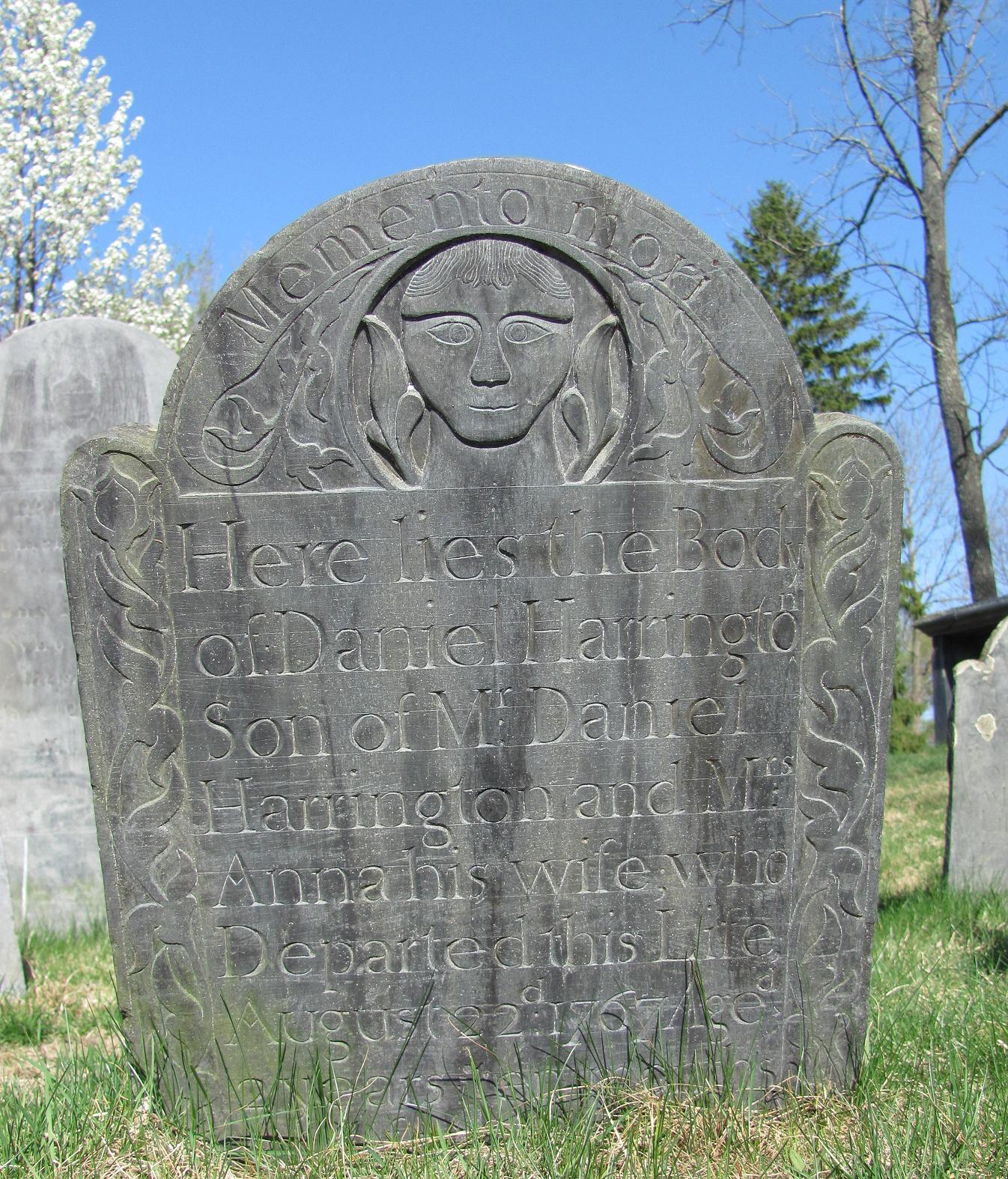“At the House of Mr. Daniel Harrington”
On 16 Oct 1769, Edes and Gill’s Boston Gazette ran this news item with the dateline “Lexington, Aug. 31, 1769.”:
The phrase “Very early in the Morning” also appeared in an earlier report about a similar spinning meeting in Beverly. Getting to work early was a sign of diligence.
The “Number of 45” was of course a symbol of John Wilkes’s reform campaign in London.
Daniel Harrington (1739-1818) was a young man whose house faced the Lexington common. In May 1760, shortly before turning twenty, he had married Anna Munroe. Their first child arrived six months later, and by 1769 they had four living children plus one—Daniel, Jr.—memorialized by the stone shown above. By 1775 Harrington would be clerk of the Lexington militia company, later rising to captain. He became a selectman in 1777 and was chosen to lead the singing in the meetinghouse in 1781.
Perhaps the most puzzling detail of this article is that a month and a half had passed since the Lexington spinning meeting. The Gazette had run reports on several similar events in the preceding months, and it would no doubt have welcomed this one as well. Someone in Lexington had to prepare the report, however; Richard Kollen speculates that was the Rev. Jonas Clarke. In many towns, the minister hosted the spinning and received the results, but not here, and perhaps that caused the delay.
The second paragraph of the report, chiding people who dismissed spinning meetings, indicates some people were indeed sneering at those events. And to be true, they didn’t produce enough good thread to have practical value. But these events were important to the Whig movement as propaganda—so they had to get into the papers.
TOMORROW: Lexington looks back on this spinning meeting.
Very early in the Morning, the young Ladies of this Town, to the Number of 45, assembled at the House of Mr. Daniel Harrington, with their Spinning-Wheels, where they spent the Day in the most pleasing Satisfaction: And at Night presented Mrs. Harrington, with the Spinning of 602 Knots of Linnen, and 546 Knots of Cotton.The quotations at the end were noted as coming from “Prov. 31. 19.”
If any should be inclin’d to treat such Assemblies or the Publication of them, with a Contemptuous Sneer, as thinking them Ludicrous: Such Persons would do well first to consider what would become of one of our (so much boasted) Manufactures, on which we pretend the Welfare [of] our Country is so much depending, if those of the fair Sex should refuse to lay their “Hands to the Spindle,” or be unwilling to “hold the Distaff.”
The phrase “Very early in the Morning” also appeared in an earlier report about a similar spinning meeting in Beverly. Getting to work early was a sign of diligence.
The “Number of 45” was of course a symbol of John Wilkes’s reform campaign in London.
Daniel Harrington (1739-1818) was a young man whose house faced the Lexington common. In May 1760, shortly before turning twenty, he had married Anna Munroe. Their first child arrived six months later, and by 1769 they had four living children plus one—Daniel, Jr.—memorialized by the stone shown above. By 1775 Harrington would be clerk of the Lexington militia company, later rising to captain. He became a selectman in 1777 and was chosen to lead the singing in the meetinghouse in 1781.
Perhaps the most puzzling detail of this article is that a month and a half had passed since the Lexington spinning meeting. The Gazette had run reports on several similar events in the preceding months, and it would no doubt have welcomed this one as well. Someone in Lexington had to prepare the report, however; Richard Kollen speculates that was the Rev. Jonas Clarke. In many towns, the minister hosted the spinning and received the results, but not here, and perhaps that caused the delay.
The second paragraph of the report, chiding people who dismissed spinning meetings, indicates some people were indeed sneering at those events. And to be true, they didn’t produce enough good thread to have practical value. But these events were important to the Whig movement as propaganda—so they had to get into the papers.
TOMORROW: Lexington looks back on this spinning meeting.


1 comment:
FWIW a "knot" is 40 yards of yarn according to this: http://kws.atlantia.sca.org/terms.html
Post a Comment